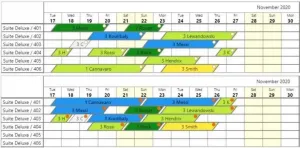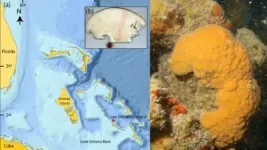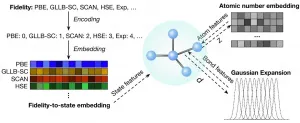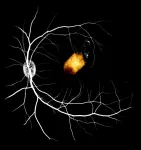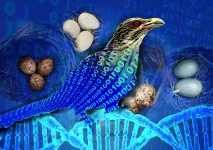INFORMATION:
Tetris is no longer just a game, but an algorithm, which ensures maximum room occupancy
There is a new way for hotels to accommodate more guests and increase their profits
2021-01-14
(Press-News.org) To achieve full occupancy, hotels used to rely exclusively on experience, concentration and human abilities. Then came online booking, which made the reservation collection process faster, but did not solve the risk of turning down long stays because of rooms previously booked for short stays.
To avoid overbooking (accepting more reservations than there is room for) in some cases online sales are blocked before hotels are completely booked. The solution that the University of Trento has just discovered could change the life of hotels by increasing the number of occupied rooms and, therefore, in the revenue of hotel owners.
For an average Italian hotel (50 rooms), an annual increase in turnover of between 5 and 10% is estimated.
The most compact way to combine supply and demand was found by the RoomTetris algorithm, which takes its name from the computer game that inspired it, Tetris.
The software was developed by the Lion Laboratory (Learning and Intelligent OptimizatioN) of the Department of Information Engineering and Computer Science of the University of Trento. The research team, led by Roberto Battiti and Mauro Brunato, collaborated with Filippo Battiti's local start-up Ciaomanager Srl which provided first-hand knowledge of everyday hotel management.
After the patent application, the procedure has also been the subject of an article in the international "Journal of Hospitality and Tourism Technology" (RoomTetris: an optimal procedure for committing rooms to reservations in hotels; Vol. 11 No. 4, 2020 pp. 589-602; DOI 10.1108/JHTT-08-2019-0108).
"It is a new and revolutionary method to manage the accommodation of guests in hotel rooms" comments Roberto Battiti. "We made the unexpected and surprising discovery of an excellent algorithm for assigning guests to rooms: there is no better way to do it and there is a mathematical theorem to prove it."
In short, RoomTetris finds the best solution, the ideal combination between demand and supply, optimizing room occupancy. A tile-matching game that no human mind, no matter how experienced and skilled, could do better, with the seriousness and scientific rigor of a mathematical demonstration. Battiti is proud as a researcher but also satisfied for giving some hope to a sector that, more than others, has been heavily hit by the pandemic's consequences.
"The intuition of the RoomTetris algorithm - he says - derives from the Tetris game, which is well-known among scientists and video game enthusiasts around the world. Coloured tiles of different shapes fall in the playing field and players must place them so that they do not build up, therefore they have to fit the blocks in the best way possible in the free cells".
He continues: "If the average profit of a hotel is 10-15% of the turnover, the increased room availability generated by the algorithm in the high season can increase it by a further 5-10% (depending on the average occupancy rate and the duration of the stay). With little effort (which is actually made by powerful computers in the cloud) there are certainly cases where the profitability can even double. I bet that within a few years almost all hotels will use our optimal algorithm, and that many hotel management habits will therefore change radically".
In practice, with RoomTetris hotels will no longer allocate rooms at the time of booking, but when guests arrive at the hotel, providing the optimal solution for a higher occupancy rate and increased profitability. Tests to measure the improvements in the occupancy rate compared to the traditional allocation of rooms were carried out through a hotel simulator in different areas, and including real hotels throughout Italy, from Trentino to Sicily, from Sardinia to Puglia.
"The success of RoomTetris, which is the first optimal room allocation algorithm for the hotel industry, suggests that the room allocation process can be managed by this algorithm at check-in, ensuring the best possible performance, at global level", concludes Battiti.
ELSE PRESS RELEASES FROM THIS DATE:
Study gauges psychological impact of COVID-19 pandemic on university students
2021-01-14
More than half of all university students in the United States have experienced high levels of psychological impact from the COVID-19 pandemic, according to a new study published in the open-access journal PLOS ONE by Matthew Browning of Clemson University, US, and colleagues.
University students are increasingly recognized as a psychologically vulnerable population, suffering from higher levels of depression, anxiety, substance abuse and disordered eating compared to the general population. Moreover, college students have been among the most strongly affected by COVID-19 because of uncertainty regarding academic success, future careers and social life during college, among other concerns.
In the new study, researchers collected data on 2,534 students ...
Smithsonian scientists reduce uncertainty in forest carbon storage calculations
2021-01-14
Investors who bet on tropical forest conservation and reforestation to solve global warming by storing carbon in wood face huge uncertainties because the science behind predicting carbon stocks is still shaky. Even the best Earth Systems Models fail to predict how carbon stored by tropical forests varies from place to place. The New Phytologist invites scientists doing the "most-exciting, ground-breaking research" to review timely topics in a way that non-scientists can understand. Helene Muller-Landau, staff scientist at the Smithsonian Tropical Research Institute (STRI) was chosen to write the authoritative Tansley Review ...
600-year-old marine sponge holds centuries-old climate records
2021-01-14
MIAMI--Scientists used a 600-year-old marine sponge to reconstruct a record of ocean temperature in the North Atlantic revealing past volcanic activity as well as the current global warming trend from the release of carbon dioxide and other heat trapping gasses into Earth's atmosphere and absorbed by the oceans.
The University of Miami (UM) Rosenstiel School of Marine and Atmospheric Science-led research team used geochemical proxies to reconstruct a 600 year-long record of Atlantic Ocean temperatures from the skeleton of a sclerosponge (Ceratoporella nicholsoni).
The basketball-sized sclerosponge was ...
New insights into pancreatitis
2021-01-14
These findings validate the significance of the previously described first threshold - the point when the damage to the acinar cells of the pancreas is sufficient to trigger the infamous inflammatory cascade (Barreto and Saccone, 2010) - while highlighting the importance of a second threshold, namely the point when a person develops clinical symptoms of the disease sufficient to warrant going to hospital.
"This transcontinental collaboration of pancreatologists drew on their vast clinical and research experience spanning decades investigating the pathophysiology and treatments ...
Scientists discover electric eels hunting in a group
2021-01-14
Deep in the Brazilian Amazon River basin, scientists led by the Smithsonian's National Museum of Natural History fish research associate C. David de Santana discovered a small, river-fed lake filled with more than 100 adult electric eels, many of which were upwards of 4 feet long. On its own, this was an intriguing discovery, electric eels--a type of knifefish rather than true eels--were thought to be solitary creatures.
But in this lake along the banks of the Iriri River in Brazil's state of Pará, the researchers witnessed the eels working together to herd small fish called tetras into tightly packed balls. Then groups of up to ...
Environment: Seagrass meadows may facilitate marine plastic removal from the sea
2021-01-14
Underwater seagrass meadows may trap, extract and carry marine plastic debris to shore, thereby helping to remove plastic litter from the sea, according to a study published in Scientific Reports.
Previous research suggested that most plastics end up in the seafloor and that some are washed back to shore; however, how this occurs was unclear.
Seagrass meadows are widespread in shallow coastal waters and are involved in trapping and binding sediment particles that form the seabed. To assess the role that seagrass may have in trapping and removing marine plastic, Anna Sanchez-Vidal and colleagues measured the amount of plastic debris collected from seagrass litter ...
New method makes better predictions of material properties using low quality data
2021-01-14
Advancements in energy technologies, healthcare, semiconductors and food production all have one thing in common: they rely on developing new materials--new combinations of atoms--that have specific properties enabling them to perform a needed function. In the not-too-distant past, the only way to know what properties a material had was by performing experimental measurements or using very expensive computations.
More recently, scientists have been using machine learning algorithms to rapidly predict the properties that certain arrangements of atoms would have. The challenge with this approach is it requires a lot of highly accurate data to train the model, which often does not exist.
By combining large ...
Retinal cell transplant clears experimental hurdle toward treating blindness
2021-01-14
Retinal cells derived from adult human eye stem cells survived when transplanted into the eyes of monkeys, an important early step in the validation of this approach for treating blindness, according to a study by Liu, et al recently published in Stem Cell Reports. The retinal pigment epithelium (RPE), a layer of pigmented cells in the retina, is essential for sustaining normal vision. Blindness due to RPE dysfunction, such as macular degeneration, affects about 200 million people worldwide.
To restore this population of cells, researchers extracted retinal stem cells from donated cadaver adult eyes, grew them into RPE cells and transplanted them into the eyes of monkeys. ...
Scientists take important step toward using retinal cell transplants to treat blindness
2021-01-14
Retinal cells derived from a cadaver human eye survived when transplanted into the eyes of primate models, an important advance in the development of cell therapy to treat blindness, according to a study published on January 14 in Stem Cell Reports.
The retinal pigment epithelium (RPE), a layer of pigmented cells in the retina, functions as a barrier and regulator in the eye to maintain normal vision. RPE dysfunction can lead to eye disorders including macular degeneration and can cause blindness, which affects about 200 million people worldwide.
To restore this population of cells, ...
Experts reduce search times for novel high-entropy alloys 13,000-fold using Cuckoo Search
2021-01-14
A major roadblock to computational design of high-entropy alloys has been removed, according to scientists at Iowa State University and Lehigh University. Engineers from the Ames Lab and Lehigh University's Department of Mechanical Engineering and Mechanics have developed a process that reduces search time used for predictive design 13,000-fold.
According to Ganesh Balasubramanian, an associate professor at Lehigh, the goal of the team's research was to accelerate the computational modeling of complex alloys. The tools available for creating random distribution of atoms in materials simulation models, he says, have been used for many, many years now and are limited in ...
LAST 30 PRESS RELEASES:
New study reveals how a key receptor tells apart two nearly identical drug molecules
Parkinson’s disease triggers a hidden shift in how the body produces energy
Eleven genetic variants affect gut microbiome
Study creates most precise map yet of agricultural emissions, charts path to reduce hotspots
When heat flows like water
Study confirms Arctic peatlands are expanding
KRICT develops microfluidic chip for one-step detection of PFAs and other pollutants
How much can an autonomous robotic arm feel like part of the body
Cell and gene therapy across 35 years
Rapid microwave method creates high performance carbon material for carbon dioxide capture
New fluorescent strategy could unlock the hidden life cycle of microplastics inside living organisms
HKUST develops novel calcium-ion battery technology enhancing energy storage efficiency and sustainability
High-risk pregnancy specialists present research on AI models that could predict pregnancy complications
Academic pressure linked to increased risk of depression risk in teens
Beyond the Fitbit: Why your next health tracker might be a button on your shirt
UCSB scientists bottle the sun with liquid battery
Lung cancer drug offers a surprising new treatment against ovarian cancer
When consent meets reality: How young men navigate intimacy
Siemens Healthineers and Mayo Clinic expand strategic collaboration to enhance patient care through advanced technology
Physicists develop new protocol for building photonic graph states
OHSU-led research initiative examines supervised psilocybin
New review identifies pathways for managing PFAS waste in semiconductor manufacturing
New research finds state-level abortion restrictions associated with increased maternal deaths
New study assesses potential dust control options for Great Salt Lake
Science policy education should start on campus
Look again! Those wrinkly rocks may actually be a fossilized microbial community
Exposure to intense wildfire smoke during pregnancy may be linked to increased likelihood of autism
Children with Crohn’s have distinct gut bacteria from kids with other digestive disorders
Genomics offers a faster path to restoring the American chestnut
Caught in the act: Astronomers watch a vanishing star turn into a black hole
[Press-News.org] Tetris is no longer just a game, but an algorithm, which ensures maximum room occupancyThere is a new way for hotels to accommodate more guests and increase their profits
